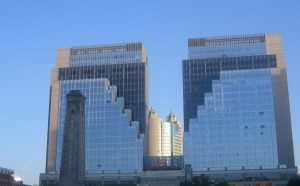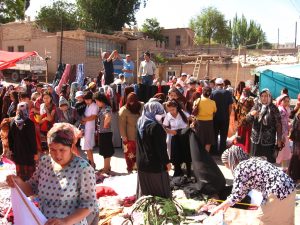Memo #57
Elena Caprioni – e.caprioni [at] ubc.ca
 According to Marxist theory, only a truly socialist society will produce equality at all levels and eliminate class struggle. Likewise, Chinese political leaders believe that only through socio-economic equality can China eliminate conflict and struggle between the majority and minorities, to solidify national unity. “Development” is thought to be crucial to achieve socio-economic equality, but ethnic prejudice is likely to fuel conflict.
According to Marxist theory, only a truly socialist society will produce equality at all levels and eliminate class struggle. Likewise, Chinese political leaders believe that only through socio-economic equality can China eliminate conflict and struggle between the majority and minorities, to solidify national unity. “Development” is thought to be crucial to achieve socio-economic equality, but ethnic prejudice is likely to fuel conflict.
Even the most inattentive and disinterested global citizen cannot ignore the tremendous economic achievements during the last decade in the Xinjiang Uyghur Autonomous Region (XUAR). Since the launch of the Western Development Program (WDP) in early 2000, the region has registered a dramatic increase in economic output. Its GDP has doubled over the last 5 years alone: from roughly 220 billion RMB in 2004 to 430 billion RMB in 2009. Zhang Chunxian – Secretary of the XUAR Committee of the Chinese Communist Party – reported that the economic growth of the region likely hit 10.5 per cent in 2010. Living conditions also improved drastically in 2010, with the per capita annual income of average urban residents up 10 per cent, to 13,500 RMB, while that of rural residents rose by 15.9 per cent to 4,500 RMB.
Do these figures mean Xinjiang will achieve socio-economic equality, and the supposed concomitant ethnic harmony, in the near future? Perhaps not. There are other less tangible obstructions to overcome, particularly the problem of ethnic prejudice. If both of the main ethnic groups living in Xinjiang, the Hans and Uyghurs, retain categorical and inflexible prejudices towards one another, an equal and “harmonious” society is not likely in the near future. Indeed, both groups believe themselves to be superior and indigenous. They also avoid intermarriage and many relations involved with the “other.” These beliefs are based on stereotypical fears of violence as well as social, dietary, and religious differences. Only with a combined strategy, promptly and carefully re-addressing ethnic prejudices together with initiatives to increase socio-economic equality, will China move towards the realization of true equality and the unity of ethnic groups in Xinjiang.
About the Author:
Elena Caprioni is a Honorary Postdoctoral Fellow, Institute of Asian Research, The University of British Columbia.
More photos on our Facebook page.
Links:
- White Paper on Development and Progress in Xinjiang, Information Office of the State Council of the People’s Republic of China, Sept 2009
- Top regional official says Xinjiang’s stability “fragile”, Xinhua, December 2010
- Xinjiang economy likely to expand 10.5% in 2010, Xinhua, January 2011
- Government social spending in Xinjiang up by 26.8% in 2010, Xinhua, January 2011
- Lai, Hongyi Harry, China’s Western Development Program: Its Rationale, Implementation, and Prospects, Modern China, Vol. 28, No. 4. October 2002, pp. 432-466
Related Memos:
- Dr. Andrew M. Fischer Discusses Development Issues in China and Tibet (Memo #17 – video interview)
- Our other Memos about China
- Our collection of Memos on the Origins of Social Protests in China

